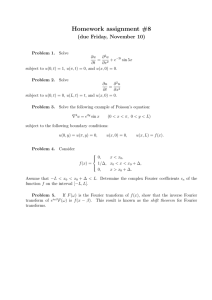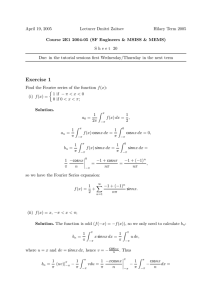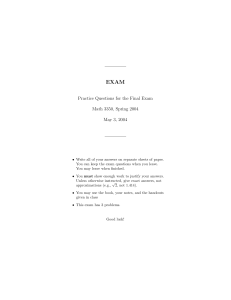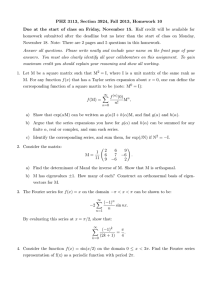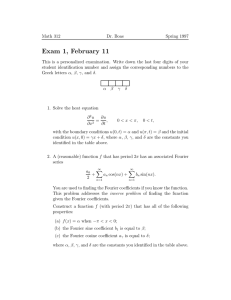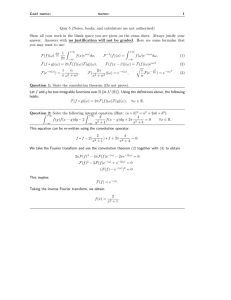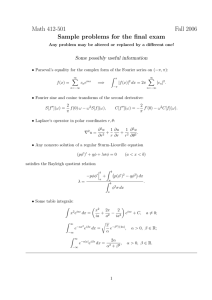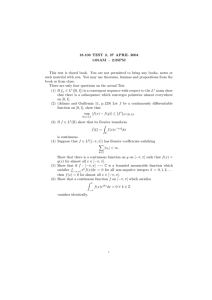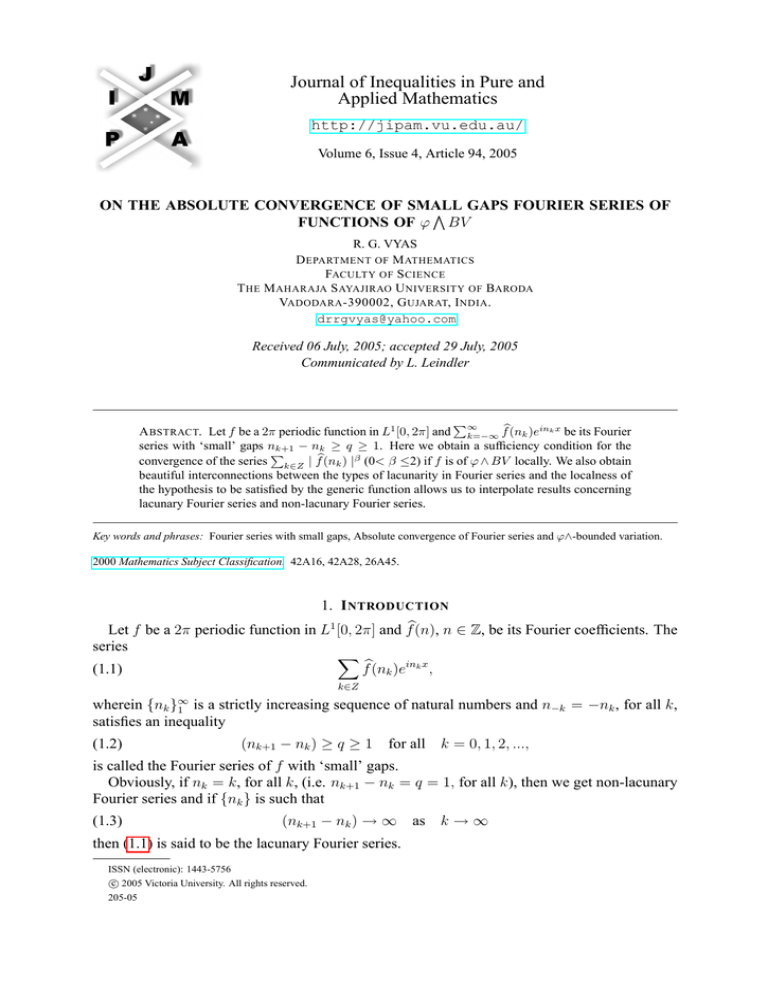
Journal of Inequalities in Pure and
Applied Mathematics
http://jipam.vu.edu.au/
Volume 6, Issue 4, Article 94, 2005
ON THE ABSOLUTE CONVERGENCE OF SMALL
V GAPS FOURIER SERIES OF
FUNCTIONS OF ϕ BV
R. G. VYAS
D EPARTMENT OF M ATHEMATICS
FACULTY OF S CIENCE
T HE M AHARAJA S AYAJIRAO U NIVERSITY OF BARODA
VADODARA -390002, G UJARAT, I NDIA .
drrgvyas@yahoo.com
Received 06 July, 2005; accepted 29 July, 2005
Communicated by L. Leindler
P∞
A BSTRACT. Let f be a 2π periodic function in L1 [0, 2π] and k=−∞ fb(nk )eink x be its Fourier
series with ‘small’ gaps nk+1 − nk ≥ q ≥ 1. Here we obtain a sufficiency condition for the
P
convergence of the series k∈Z | fb(nk ) |β (0< β ≤2) if f is of ϕ ∧ BV locally. We also obtain
beautiful interconnections between the types of lacunarity in Fourier series and the localness of
the hypothesis to be satisfied by the generic function allows us to interpolate results concerning
lacunary Fourier series and non-lacunary Fourier series.
Key words and phrases: Fourier series with small gaps, Absolute convergence of Fourier series and ϕ∧-bounded variation.
2000 Mathematics Subject Classification. 42A16, 42A28, 26A45.
1. I NTRODUCTION
Let f be a 2π periodic function in L1 [0, 2π] and fb(n), n ∈ Z, be its Fourier coefficients. The
series
X
(1.1)
fb(nk )eink x ,
k∈Z
{nk }∞
1
wherein
is a strictly increasing sequence of natural numbers and n−k = −nk , for all k,
satisfies an inequality
(1.2)
(nk+1 − nk ) ≥ q ≥ 1 for all
k = 0, 1, 2, ...,
is called the Fourier series of f with ‘small’ gaps.
Obviously, if nk = k, for all k, (i.e. nk+1 − nk = q = 1, for all k), then we get non-lacunary
Fourier series and if {nk } is such that
(1.3)
(nk+1 − nk ) → ∞ as k → ∞
then (1.1) is said to be the lacunary Fourier series.
ISSN (electronic): 1443-5756
c 2005 Victoria University. All rights reserved.
205-05
2
R. G. V YAS
In 1982 M. Schramm and D. Waterman [3] have introduced the class ϕ ∧ BV (I) of functions of ϕ∧-bounded variation over I and have studied sufficiency conditions for the absolute
convergence of Fourier series of functions of ∧BV (p) and ϕ ∧ BV .
Definition 1.1. Given a nonnegative convex function ϕ, defined on [0, ∞) such that ϕ(x)
→0
x
as x → 0, for some constant d ≥ 2, V
ϕ(2x) ≤ dϕ(x) for all x ≥ 0 and given
P a sequence of
non-decreasing positive real numbers = {λm } (m = 1, 2, . . .) such that m λ1m diverges we
V
V
say that f ∈ ϕ BV (that is f is a function of ϕ -bounded variation over (I)) if
VΛϕ (f, I) = sup {VΛϕ ({Im }, f, I)} < ∞,
{Im }
where
VΛϕ ({Im }, f, I) =
X ϕ |f (bm ) − f (am )|
m
λm
!
,
and {Im } is a sequence of non-overlapping subintervals Im = [am , bm ] ⊂ I = [a, b].
Definition 1.2. For p ≥ 1, the p-integral modulus of continuity ω (p) (δ, f, I) of f over I is
defined as
ω (p) (δ, f, I) = sup k(Th f − f )(x)kp,I ,
0≤h≤δ
where Th f (x) = f (x + h) for all x and k(·)kp,I = k(·)χI kp in which χI is the characteristic
function of I and k(·)kp denotes the Lp -norm. p = ∞ gives the modulus of continuity ω(δ, f, I).
By applying the Wiener-Ingham result [1, Vol. I, p. 222] for the finite trigonometric sums
with ‘small’ gap (1.2) we
β have already studied the sufficiencyVconditions for the convergence of
P
b
the series k∈Z f (nk ) (0 < β ≤ 2) for the functions of BV and ∧BV (p) in terms of the
V
modulus of continuity [6]. Here we obtain a sufficiency condition if function f is of ϕ BV .
We prove the following theorem.
Theorem 1.1. Let f ∈ L[−π, π] possess
V a Fourier series with ‘small’ gaps (1.2) and I be a
.
If
f
∈
ϕ
BV (I), 1 ≤ p < 2r, 1 ≤ r < ∞, and
subinterval of length δ1 > 2π
q
β
2r−p r1 , 2
1
((2−p)s+p)
∞
, f, I
X
−1 ω
nk
ϕ
P
k
nk 1
< ∞,
j=1 λj
k=1
where
(1.4)
1
r
+
1
s
= 1, then
β
X fb(nk ) < ∞
(0 < β ≤ 2).
k∈Z
Theorem 1.1 with β = 1 is a ‘small’ gaps analogue of the Schramm and Waterman result [3,
Theorem 2]. Observe that the interval I considered in the theorem for the gap condition (1.2)
is of length > 2π
, so that when nk = k, for all k, I is of length 2π. Hence for non-lacunary
q
Fourier series (equality throughout in (1.2)) the theorem with β = 1 gives the Schramm and
Waterman result [3, Theorem 2] as a particular case.
We need the following lemmas to prove the theorem.
Lemma 1.2 ([2, Lemma 2]). Let f and I be as in Theorem 1.1. If f ∈ L2 (I) then
2
X −1
b
(1.5)
f (nk ) ≤ Aδ |I| k f k22,I ,
k∈Z
J. Inequal. Pure and Appl. Math., 6(4) Art. 94, 2005
http://jipam.vu.edu.au/
A BSOLUTE C ONVERGENCE O F S MALL G APS F OURIER S ERIES
3
where Aδ depends only on δ.
Lemma 1.3. If |nk | > p then for t ∈ N one has
Z π
p
sin2t |nk | hdh ≥
0
π
2t+1 p
.
Proof. Obvious.
Lemma 1.4 (Stechkin, refer to [5]). If un ≥ 0 for n ∈ N, un 6= 0 and a function F (u) is
concave, increasing, and F (0) = 0, then
∞
∞
X
X
un + un+1 + · · ·
F (un ) ≤ 2
F
.
n
1
1
δ1
Proof of Theorem 1.1. Let I = x0 − 2 , x0 + δ21 for some x0 and δ2 be such that 0 < 2π
<
q
δ2 < δ1 . Put δ3 = δ1 − δ2 and J = x0 − δ22 , x0 + δ22 . Suppose integers T and j satisfy
4π
δ3
|nT | >
(1.6)
0≤j≤
and
δ3 |nT |
.
4π
f ∈ ϕ ∧ BV (I) implies
|f (x)| ≤ |f (a)| + |f (x) − f (a)| ≤ |f (a)| + Cϕ−1 (V∧ϕ (f, I)) for all x ∈ I.
Since f is bounded over I, we have f ∈ L2 (I), so that (1.5) holds and f ∈ L2 [−π, π]. If we put
fj = (T2jh f − T(2j−1)h f ) then fj ∈ L2 (I) and the Fourier series of fj also possess gaps (1.2).
Hence by Lemma 1.2 we get
2
X nk h
2
ˆ
(1.7)
= O kfj k22,J
f (nk ) sin
2
k∈Z
because
nk h
.
2
Integrating both the sides of (1.7) over (0, nπT ) with respect to h and using Lemma 1.3, we get
Z π ∞
2
X
nT
ˆ
kfj k22,J dh.
(1.8)
RnT =
f (nk ) = O(nT )
1
fˆj (nk ) = 2ifˆ(nk )eink (2j− 2 h) sin
0
|nk |≥nT
Since 2 =
(2−p)s+p
s
+ pr , by using Hölder’s inequality, we get from (1.8)
Z
B = |fj (x)|2 dx
J
Z
≤
1s Z
(2−p)s+p
|fj (x)|
≤
r1
|fj (x)| dx
dx
J
1/r
Ωh,J
p
J
Z
r1
p
|fj (x)| dx
,
J
where Ωh,J = (ω (2−p)s+p (h, f, J))2r−p . Thus
(1.9)
r
Z
B ≤ Ωh,J
|fj (x)|p dx.
J
Since f is bounded over I, there exists some positive constant M ≥ 12 such that |f (x)| ≤ M
for all x ∈ I. Dividing f by the positive constant M alters ωp (h, f, J) by the same constant M
J. Inequal. Pure and Appl. Math., 6(4) Art. 94, 2005
http://jipam.vu.edu.au/
4
R. G. V YAS
and ϕ(2 |f (x)|) ≤ dϕ(|f (x)|) for all x, we may assume that |f (x)| ≤ 1 for all x ∈ I. Hence
from (1.9) we get
Z
r
B ≤ Ωh,J |fj (x)| dx.
J
Since ϕ(2x) ≤ dϕ(x), we have ϕ(ax) ≤ dlog2 a ϕ(x), so
r
R
|fj (x)| dx
B
log2 CΩh,J
J
ϕ
≤d
ϕ
δ2
δ2
R
|fj (x)| dx
log2 d
J
= CΩh,J ϕ
δ2
R
|f (x)| dx
log2 d−1
J Rj
= CΩh,J
Ωh,J ϕ
1dx
J
R
ϕ |fj (x)| dx
J
≤ CΩh,J
(by Jensen’s inequality for integrals)
δ2
Z
= CΩh,J
ϕ |fj (x)| dx .
J
Multiplying both the sides of the equation by λ1j and then taking the summation over j = 1 to
nT (T ∈ N) we get
! !
r
Z X
nT
Ω
B
ϕ
|f
(x)|
h,J
j
(1.10)
ϕ
≤ C P
dx .
nT
1
δ2
λj
J
j=1
j=1
λj
Observe that for x in J, h in (0, nπT ) and for each j of the summation the points x + 2jh and
x + (2j − 1)h lie in I; moreover f ∈ ϕ ∧ BV (I) implies
nT
X
ϕ |fj (x)|
j=1
λj
Therefore, it follows from (1.10) that
= O(1).
r1
Ω1/n ,I
B = O ϕ−1 P T .
nT
1
j=1
λj
Substituting back the value of B in the equation (1.8), we get
r1
∞
X Ω1/n ,I
2
RnT =
fˆ(nk ) = O ϕ−1 P T .
nT
1
|nk |≥nT
j=1
λj
Thus
2r−p r1
1
(2−p)s+p
, f, I
−1 ω
nT
= O
ϕ
PnT
.
1
RnT
j=1
J. Inequal. Pure and Appl. Math., 6(4) Art. 94, 2005
λj
http://jipam.vu.edu.au/
A BSOLUTE C ONVERGENCE O F S MALL G APS F OURIER S ERIES
5
2
ˆ
Finally, Lemma 1.4 with uk = f (nk ) (k ∈ Z) and F (u) = uβ/2 gives
∞ ∞
β
2 X
X
ˆ
ˆ
F f (nk )
f (nk ) = 2
|k|=1
k=1
≤4
∞
X
F
k=1
=4
Rnk
k
β2
∞ X
Rn
k
k
k=1
= O(1)
∞
X
k=1
"
ϕ−1
(ω
( n1k , f, I))2r−p
Pnk 1
j=1 λj
(2−p)s+p
!# r1 , β2
k .
This proves the theorem.
R EFERENCES
[1] A. ZYMUND, Trigonometric Series, 2nd ed., Cambridge Univ. Press, Cambridge, 1979 (reprint).
[2] J.R. PATADIA AND R.G. VYAS, Fourier series with small gaps and functions of generalized variations, J. Math. Analy. and Appl., 182(1) (1994), 113–126.
[3] V
M. SCHRAMMVAND D. WATERMAN, Absolute convergence of Fourier series of functions of
BV (p) and Φ BV, Acta. Math. Hungar, 40 (1982), 273–276.
[4] N.K. BARRY, A Treatise on Trigonometric Series, Pergamon, New York, 1964.
[5] N.V. PATEL AND V.M. SHAH, A note on the absolute convergence of lacunary Fourier series, Proc.
Amer. Math. Soc., 93 (1985), 433–439.
[6] R.G. VYAS, On the Absolute convergence of small gaps Fourier series of functions of ∧BV(p) , J.
Inequal. Pure and Appl. Math., 6(1) (2005), Art. 23, 1–6. [ONLINE: http://jipam.vu.edu.
au/article.php?sid=492]
J. Inequal. Pure and Appl. Math., 6(4) Art. 94, 2005
http://jipam.vu.edu.au/

